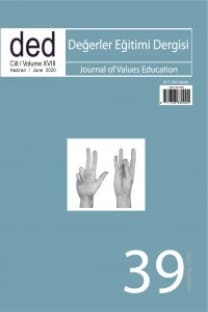Türk Toplumunda Çocuğun Yetiştirilmesinde Annenin Rolü: Konya İli Örneği
Bu araştırmada, Türk toplumunda çocuğun yetiştirilmesinde annenin rolleri ortaya konulmaya çalışılmıştır. Araştırmada uygulama sadece anneler üzerinde gerçekleştirilmiş, fakat çocuk yetiştirilmesinde babanın rolü, babadan beklentiler de annelere sorularak tespit edilmeye çalışılmıştır. Böylece annenin çocuk yetiştirmedeki işlevlerinin Türk toplumundaki boyutu, alan araştırması verileriyle tespit edilmeye çalışılmıştır. Araştırmada her şeyden önce ebeveynin kendi aralarındaki ilişkilerde ciddî sorunların bulunduğu, ebeveyn çocuk arasındaki ilişkilerde bir dengeden söz etmenin çok fazla mümkün olmadığı, babaların çocuklarını yetiştirmede üstlerine düşen görevleri yerine getirmediği, çocuğun lürk toplumunda hâla bir yaşlılık sigortası olarak görüldüğü tespit edilmiştir.
Anahtar Kelimeler:
Anne Rolü, Baba Rolü, Aile İçi İletişim, Çocuk Eğitimi, Ahlâk Eğitimi, Ebeveyn
Mothers' Role in Raîsİng Children in Turkish Society: A Case of Konya
The purpose of the preseni study zoas to preseni the role of mothers' in
raising children in Turkish society by an example of Konya. Hoıuever, in addition
to studying mothers, also studied zoas the role of fathers in raising children and
the expectations from fathers via questioning the mothers. Thus, the Turkish
dimension of the functions of mothers in raising children was investigated by
using field study techniques. The results shozoed that there are serious relationship
problems betıoeen the parents themselves, that it is difficult to talk about any
kind of balance betıoeen the parents and the child, that the fathers do not fulfill
their dulics İn raising children, and that children are stili seen as a means of
insurance in parents' old ages.
Keywords:
Mothers1 role, Fathers' role, Parental Communication, Value Education, Parenthood.,
___
An & diğerleri (1997). Gelişim ve öğrenme psikolojisi [eğitimin psikolojik temelleri). Konya: Mik.ro Yayınlan.Baling, J. (1994). VVork and family: in search of More Effecyive VVorkplace Interventions, Trends in Organisation Behavior, Vol.l( Eds. O.L.Cooper & D.M. Rousseu), John VViley & Sone Ltd.
Cohen, R N. & Bianchi, S. (December, 1999). Marriage, children and women's employment; what we do know? Monthly Lahor R.eview, 122 (12), 22-31.
Ekşi, A. (1990). Çocuk, genç ana-bahalar. İstanbul: Bilgi Yayınevi.
Rrlanger, H. B. (1987). Social-class and corporal punishment in child rearing: Areassesment. American Social Review, 39, 68-85.
Etaugh, C. (1993). Maternal employment; Effects on children- İçinde J. Frankel (Ed.) The Employed Mother and the Family Context (pp. 68-88). New York: Springer.
Gander, M. .1. & Gardiner, H. VV. (1988). Çocuk ve ergen gelişimi (Yayına haz. Bekir Onur). Ankara: İmge Kitapevi.
' loffman. L. VV. (1977). Ghanges in family roles, socializations and ,sex dîfferences Amerİcm Psychologist, 32.
Kağıtçıbaşı, Ç. (1981). Çocuğun değeri. İstanbul: Boğaziçi Üniversitesi İdari Bil. Fak. Yay.
Parker, G. (1983). Parental overprotection: A risk funetion in [>sychoscxual development. New York: Grurıe and Stration.
Razon, N. (1983]. Çalışan kadınlar ve sorunları. Aile ve Çocuk.
Rutter, M. (1985). Aspects of ehil d rearing and fatnily funetion, child and adolescent psichîatry (Eds. M. Rutter & L Hersow). London: Blackwell.
Sargın, N. (2001). Çocuklardı ruh sağlığı. Ankara: Nobcl Yay.
Saygılı, S. (2003). Annemi istiyorum. İstanbul: Elit Yay.
Tezcan, M. (1986). Ülkemizde toplumsal değişmelerin ailede çocuk eğitimine yansıması. Aile ve Çocuk Dergisi, 5.
Yavuzer, H. (1905). AnaAtabs ve çocuk. 8. Basım. İstanbul: Remzi Kitabevi.
Yücel, D. (2003). Doğumdan sonra İşe ve hayata dönmek. Çocuk ve Aile, 58.
- ISSN: 1303-880X
- Yayın Aralığı: Yılda 2 Sayı
- Başlangıç: 2003
- Yayıncı: Ensar Neşriyat Ticaret A.Ş.
Sayıdaki Diğer Makaleler
İlahiyat Fakülteleri Dergilerinde Yayımlanan Din E&itimi Konulu Makaleler Üzerine Bir Değerlendirme
Kişilerin Batıl İnanç Kaygı Düzeylerinin Bazı Değişkenler Açısından İncelenmesi
Toplumumuzda ve Öğretmen Adayları Arasında Öğretmenlik Mesleğine Verilen Değer Üzerine Bir Araştırma
Orhan KARAMUSTAFAOĞLU, Haluk ÖZMEN
İmam Hatip(li)ler Üzerine: Teolojik Birikimin Modern Kaynakları
Öğretim Elemanlarının İnternet Kullanımında Etik İlkelere Uyma Düzeyleri
Erkan YAMAN, Havva YAMAN, Al Barış HORZUM
İlahiyat Fakülteleri Dergilerinde Yayımlanan Din E&itimi Konulu Makaleler Üzerine Bir Değerlendirme
Modern Japonya'da Konfüçyen Felsefî Değerler
Türk Toplumunda Çocuğun Yetiştirilmesinde Annenin Rolü: Konya İli Örneği
